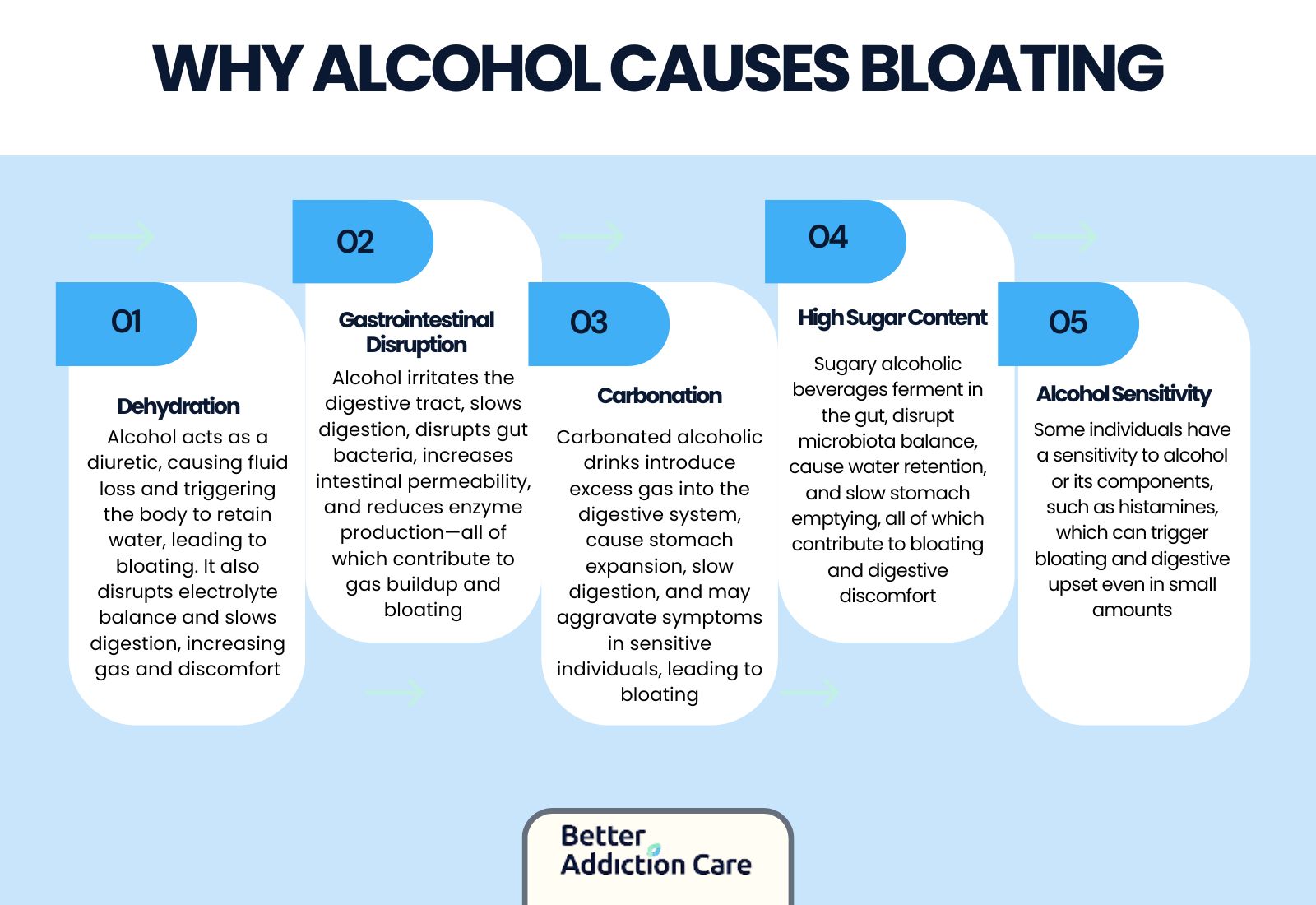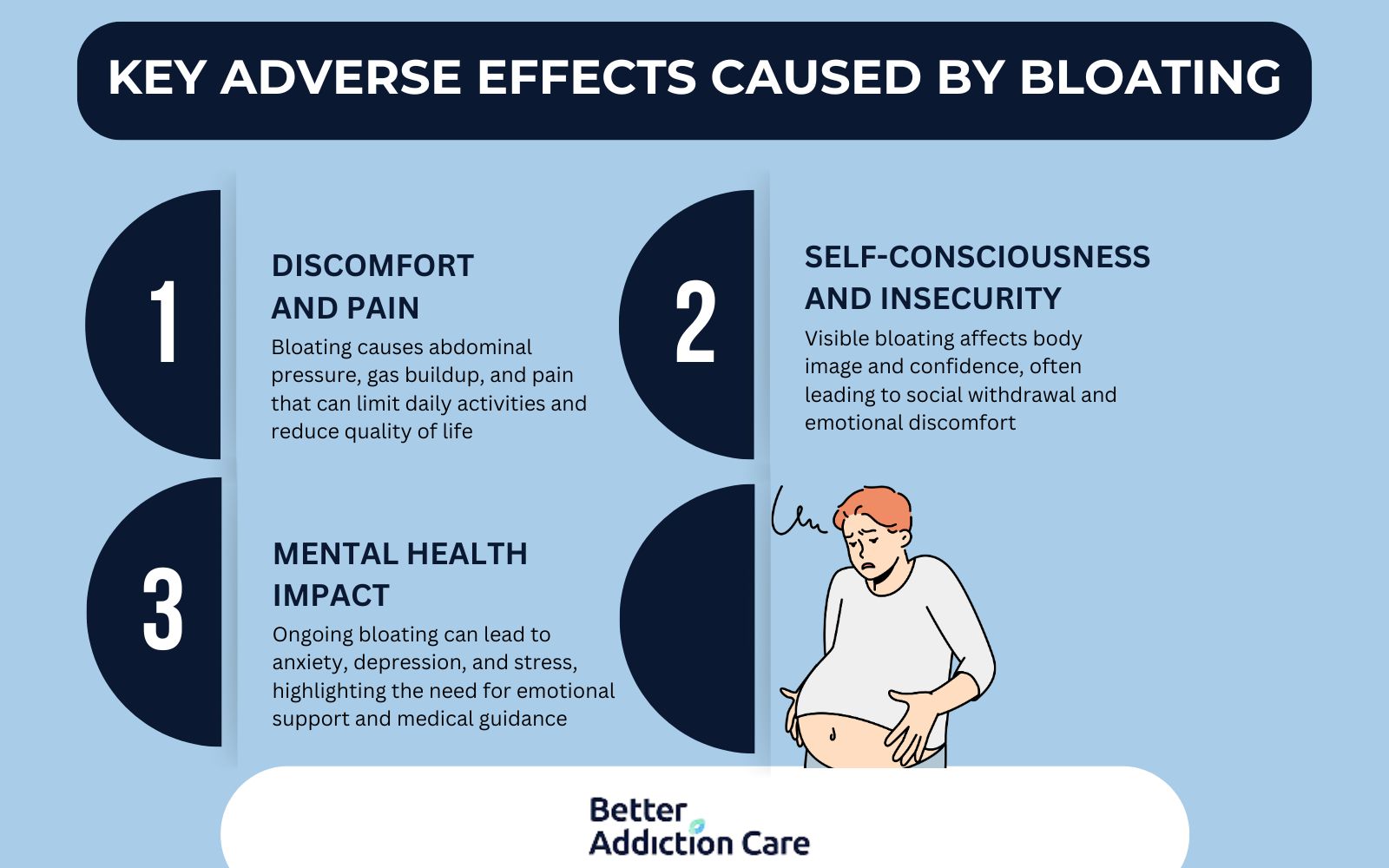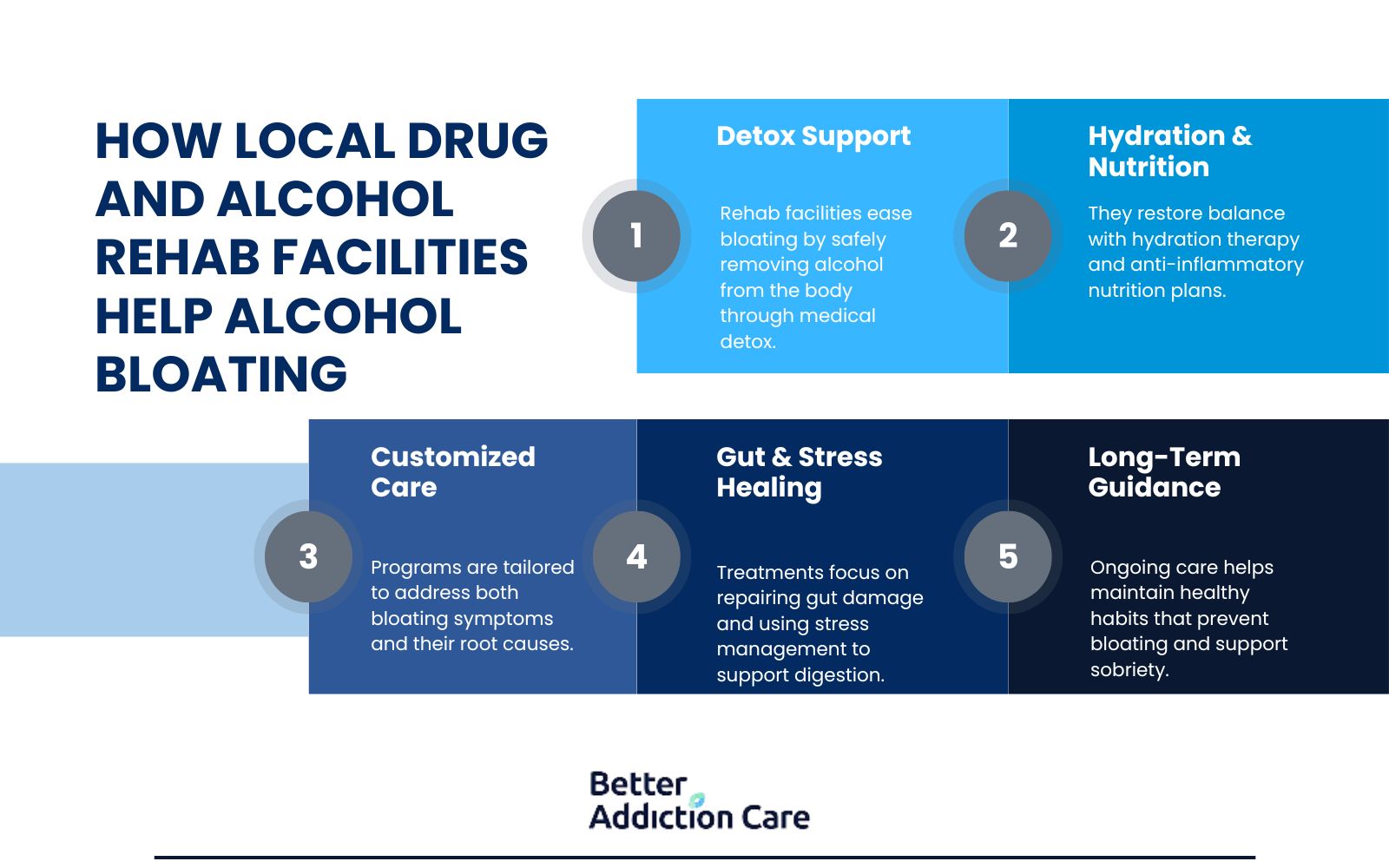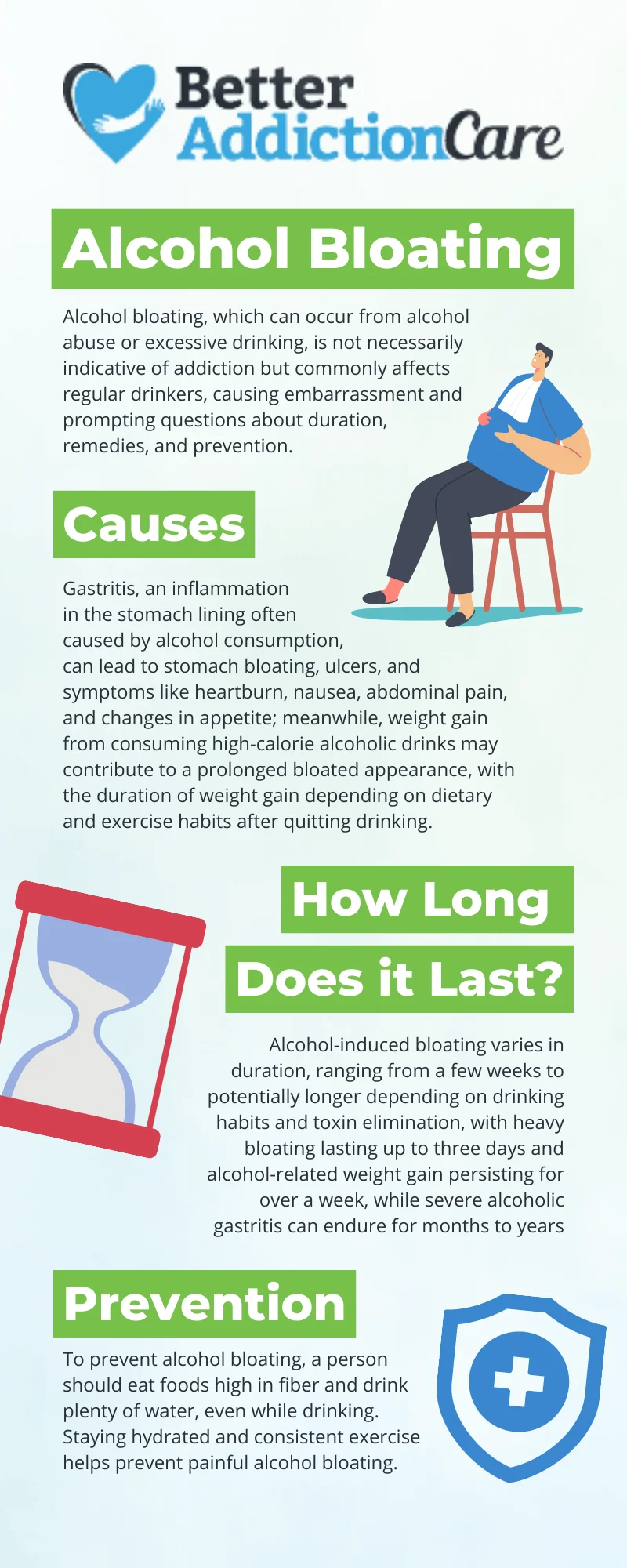Understanding Alcohol Bloating
Alcohol bloating refers to the uncomfortable sensation of fullness and swelling in the abdomen caused by factors such as fluid retention, gastrointestinal disruption, gas accumulation, and fermentation of sugars from alcoholic beverages.

Alcohol causes bloating by disrupting normal fluid balance, irritating the digestive tract, introducing excess gas through carbonation, and fermenting sugars in the gut. Factors such as dehydration, gastrointestinal disruption, high sugar content, and individual alcohol sensitivity contribute to bloating, leading to discomfort and negative health effects.
According to Swanson, G. R.’s 2010 study, ‘Pattern of Alcohol Consumption and its Effect on Gastrointestinal Symptoms in Inflammatory Bowel Disease’, 75% of IBD patients who drink alcohol reported worsened GI symptoms, including bloating, compared to 43% of IBS patients. This difference was statistically significant (p=0.01). The study evaluated gas/bloating specifically as one category in their GI symptom assessment. No correlation existed between the type of alcoholic beverage and symptom severity.
Alcohol bloating leads to abdominal discomfort, increased self-consciousness, and negative impacts on mental health, potentially resulting in social withdrawal. It creates a sensation of fullness and pain, hindering daily activities and fostering feelings of judgment from others. This discomfort contributes to anxiety and depression, emphasizing the need for support and intervention.
Why Does Alcohol Cause Bloating?

Alcohol causes bloating by disrupting normal fluid balance, irritating the digestive tract, introducing excess gas through carbonation, and fermenting sugars in the gut. Some individuals also experience bloating due to specific alcohol sensitivities or intolerances.
Here are the common causes of why alcohol causes bloating:
Dehydration
Dehydration occurs when the body loses more fluids than it takes in, leading to an imbalance in fluid levels. Alcohol-induced dehydration causes bloating through the body's compensatory mechanisms. Alcohol acts as a diuretic, increasing urine output and leading to fluid loss. This results in dehydration, prompting the body to retain water to preserve fluid balance, which causes bloating, especially in the face and abdomen.
Dehydration also disrupts electrolyte balance, affecting sodium and potassium levels essential for fluid regulation and cellular function. Electrolyte imbalances worsen fluid retention, contributing to bloating. Additionally, dehydration impairs digestive function by reducing enzyme production and slowing bowel movements, causing food to remain in the digestive tract longer, leading to discomfort and gas buildup. Staying hydrated by drinking water before, during, and after alcohol consumption reduces the risk of dehydration and bloating.
Gastrointestinal Disruption
Alcohol disrupts the digestive system, leading to gastrointestinal dysfunction that contributes to alcohol bloating. When consumed, alcohol irritates and inflames the lining of the stomach and intestines, causing various gastrointestinal problems.
Here are the key ways gastrointestinal problems cause bloating:
-
Inflammation: Alcohol irritates the gastrointestinal tract, causing inflammation that disturbs normal digestive processes and leads to discomfort, gas, and bloating.
-
Slowed Digestion: Alcohol impedes the passage of food through the digestive system, resulting in delayed gastric emptying. This causes food and waste to remain in the stomach and intestines longer, increasing the risk of gas accumulation and bloating.
-
Disruption of Gut Microbiota: Alcohol disturbs the balance of gut microbiota, leading to dysbiosis. This imbalance promotes the fermentation of undigested food particles, resulting in increased gas production and bloating.
-
Increased Permeability of Intestinal Lining: Chronic alcohol intake increases intestinal permeability, known as "leaky gut syndrome." This allows toxins and undigested food particles to enter the bloodstream, causing an immune response and inflammation, which leads to bloating.
-
Altered Secretion of Digestive Enzymes: Alcohol inhibits the secretion of digestive enzymes necessary for proper digestion. Insufficient enzymes result in improper food breakdown, leading to fermentation and gas formation in the intestines.
Carbonation
Alcohol carbonation, commonly found in beverages like beer and sparkling wines, causes bloating for several reasons.
Here is how carbonated beverages cause bloating:
-
Gas Content: Carbonated alcoholic beverages contain dissolved carbon dioxide gas, which forms bubbles when the drink is opened. Ingesting these bubbles leads to sensations of fullness and bloating in the stomach and intestines.
-
Increased Gas Formation: Carbonation accelerates gas formation in the gastrointestinal tract. Released carbon dioxide interacts with other gases produced during digestion, such as methane and hydrogen, leading to greater gas accumulation and bloating.
-
Gastric Distension: Carbonation causes gastric distension, or stomach expansion. The bubbles expand in the stomach, stretching its walls and creating feelings of fullness and discomfort, contributing to bloating.
-
Slower Digestion: Carbonation reduces the rate at which the stomach empties its contents into the intestines. This delayed gastric emptying prolongs the presence of food and gas in the stomach, increasing the risk of bloating.
-
Sensitivity to Carbonation: Individual sensitivity to carbonation varies. Those with pre-existing gastrointestinal issues, such as irritable bowel syndrome (IBS) or functional dyspepsia, experience heightened bloating and discomfort after consuming carbonated beverages.
High Sugar Content
Alcoholic beverages' high sugar content contributes to bloating by promoting gas production through gut fermentation, disrupting gut microbiota, increasing water retention, and slowing gastric emptying.
According to Fernández-Bañares, F.’s 2006 study, ‘Sugar malabsorption in functional abdominal bloating: A pilot study on the long-term effect of dietary treatment.’, 72.2% of patients with functional abdominal bloating and gas-related symptoms demonstrated sugar malabsorption.
Here is how the sugar content of alcoholic beverages causes bloating:
-
Fermentation in the Gut: Sugary alcoholic beverages serve as a readily available source of fermentable carbohydrates for gut bacteria. When these sugars enter the intestines undigested, gut bacteria ferment them, producing gases like hydrogen, methane, and CO2. The accumulation of gas in the intestines leads to bloating and pain.
-
Imbalance in Gut Microbiota: Excessive consumption of sugary alcoholic beverages leads to dysbiosis, an imbalance of intestinal microorganisms. This imbalance results in an overpopulation of certain bacteria, which produce more gas during fermentation, exacerbating bloating and digestive problems.
-
Water Retention: Sugary alcoholic drinks lead to water retention, contributing to a bloated sensation.
-
Delayed Gastric Emptying: High-sugar alcoholic beverages slow down stomach emptying, prolonging the sensation of fullness and bloating
Alcohol Sensitivity
Alcohol sensitivity leads to bloating in some individuals after consuming alcoholic beverages. This sensitivity results from histamine intolerance, fermentation byproducts, or other components in alcohol. For certain individuals, even moderate doses of alcohol trigger bloating, pain, and other negative responses. Understanding one's alcohol sensitivity helps individuals make informed choices about beverage selections and consumption habits, reducing the risk of bloating and other discomfort.
What Hidden Adverse Effects Does Alcohol Bloating Cause?

Hidden adverse effects caused by alcohol bloating are discomfort throughout the abdomen, heightened self-consciousness about physical appearance, and deteriorating mental well-being, potentially leading to social withdrawal and emotional distress.
Here are the key adverse effects caused by bloating:
Discomfort and Pain
Bloating causes discomfort and pain, impacting individuals physically and emotionally. It creates a sensation of fullness and tightness in the abdomen, ranging from mild discomfort to severe agony. This discomfort results from pressure from trapped gas in the digestive tract, leading to intestinal distention and stretching.
Bloating induces feelings of heaviness and pressure, hindering movement and daily activities. Inflammation, gastrointestinal issues, and underlying digestive diseases increase bloating-related pain. Discomfort and pain from bloating significantly affect an individual's quality of life, highlighting the need to address underlying causes and implement symptom-relief strategies.
Self-Consciousness and Insecurity
Bloating causes feelings of self-consciousness and insecurity, impacting individuals emotionally and socially. Visible abdominal distension leads to self-awareness and concern about appearance, especially in social situations where physical presentation matters. Individuals with bloating feel examined or judged by others, intensifying unease and discomfort.
This self-consciousness affects overall well-being, including confidence and interpersonal interactions. Concerns related to bloating lead to avoidance of social situations or activities that exacerbate discomfort, isolating individuals from enjoyable experiences. Managing self-consciousness and insecurity from bloating requires empathy, understanding, and support from oneself and others.
Negative Impact on Mental Health
Bloating significantly impacts mental health, leading to anxiety, depression, and body image issues. The discomfort and unpredictability of bloating episodes increase stress and social isolation. Seeking help from healthcare professionals and building a support network is crucial for addressing the physical and mental consequences of bloating.
How Long Does Alcohol Bloating Last?
Alcohol bloating lasts anywhere from a few hours to 2-3 days, depending on individual factors like metabolism and the amount consumed. The bloating occurs as your body processes alcohol, causing inflammation and fluid retention in your digestive system. To reduce the duration of bloating, stay hydrated with plenty of water, eat light, potassium-rich foods, avoid carbonated beverages, and abstain from further alcohol consumption. If bloating persists beyond several days or is accompanied by severe pain, seek medical attention, as it could indicate an underlying health issue.
What Are Some Alcohol Abuse Triggers?
Alcohol abuse triggers include social events, stress, negative emotions, certain people, locations associated with past drinking, and exposure to alcohol advertising. The brain forms conditioned links between these substance abuse triggers and alcohol consumption, making them powerful relapse risks.
Can Binge Drinking Cause Alcohol Bloating?
Yes, binge drinking causes alcohol bloating. Excessive alcohol consumption leads to inflammation in the digestive system and disrupts normal fluid balance in the body. Episodes of binge drinking contribute significantly to bloating because alcohol acts as a diuretic, causing dehydration and water retention. This condition affects many regular drinkers and typically manifests as swelling in the abdomen, face, and extremities.
How Local Drug and Alcohol Rehab Facilities Help Alcohol Bloating?

Local drug and alcohol rehab helps you with alcohol bloating by providing medical detoxification that safely eliminates alcohol from your system while reducing digestive discomfort. They implement hydration therapy to counter alcohol's dehydrating effects and offer nutritional guidance specifically targeting inflammation reduction and digestive health restoration.
These programs address both immediate symptoms and underlying causes of alcohol bloating through personalized care plans. Medical professionals monitor your physical recovery while teaching you about alcohol's effects on your digestive system.
The specialized programs at local drug and alcohol rehab facilities focus on repairing gut damage caused by alcohol consumption. They integrate stress management techniques that improve digestive function alongside bloating reduction. Throughout recovery and aftercare, you receive ongoing support to maintain proper hydration, nutrition, and lifestyle habits that prevent future bloating issues while supporting your sobriety journey.

Related Articles
Treatment Centers in Michigan
 123
123
 123
123
 123
123





